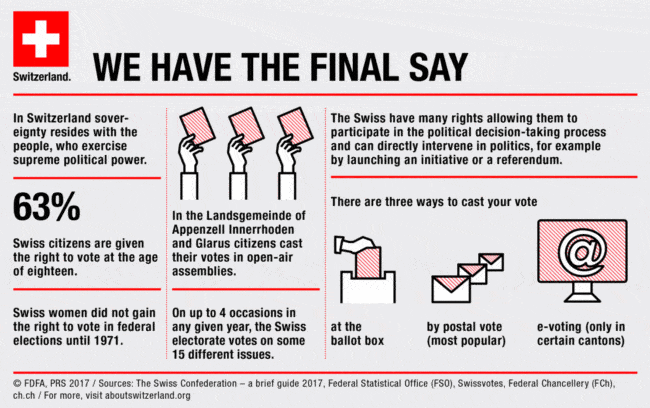
Image credits: https://www.eda.admin.ch/
A semi-direct democracy
Switzerland is a semi-direct democracy, which means that citizens are regularly called upon to vote on many subjects, sometimes quite technical.
Democracy applies to three different levels: national, cantonal and communal. Very few countries offer their citizens such decision-making power.
A vote can result from a popular initiative or an optional referendum. At the federal level, people who want to make a modification in the federal constitution submit an initiative and have to collect 100’000 signatures so that a vote is organized. People opposed to a law voted by the Parliament have to collect 50’000 signatures to have the subject submitted for a citizen’s vote.
It is a privilege for Swiss citizens to have such influence on the politics of the country, but it is of course a big responsibility as well and many debates precede each vote.
To take a concrete and current example, the Swiss will be called upon to vote on September 27, 2020 on no less than five topics:
- Popular initiative “for moderate immigration”
- Amendment of the hunting law
- Amendment of the Federal Law on Direct Tax (Tax deduction of childcare costs by third parties)
- Amendment of the law on allowances for loss of earnings (introduction of two weeks paternity leave)
- Federal decree on the acquisition of new combat aircraft
The French-speaking version of the brochure I received in my letterbox has no less than 88 pages, explaining the arguments of supporters and opponents, the position of the Parliament and the government’s recommendation for each subject, as well as the full text of the proposed changes to legislative texts.
An additional (and fortunately much smaller) document indicates the position taken by each political party represented in the cantonal Parliament.
Many other organizations also make their voice heard as far as they are concerned: labor unions, employers’ unions, chambers of commerce, NGOs, associations or motorist’s clubs, for example.
Depending on the vote outcomes, different forms of opposition may occur: left vs right, big cities vs countryside, French-speaking Switzerland vs German-speaking, protestant cantons vs catholic, etc.
The results of these votes are the subject of much commentary on both television and print media.
My role as an employer and education leader
A question I have often asked myself as an employer and education leader is whether I should give my employees and the general public voting recommendations. I have mostly refrained from doing so, believing that every employee is free to have his or her opinion and such recommendations could be seen as a form of outdated paternalism.
Nevertheless, it can happen that a popular decision has a direct impact on our industry and only in such cases have I exceptionally allowed myself to deviate from this stance.
With these upcoming votes, I feel that it is particularly important to inform people of the complete viewpoint, as many people were unfortunately not aware of the stakes in the previous vote on immigration.
The most important subject in the upcoming votes, in my opinion
In my opinion, mostly shared by the media and the majority of Swiss people, the most important subject for the vote of September 27 is the initiative “for moderate immigration”.
This initiative was launched by the conservative Democratic Center Union party dissatisfied with the way the federal state implemented the previous initiative they initiated on this subject and which was approved by the Swiss population.
The agreement on the free movement of people, signed with the European Union and the European Free Trade Association, has clearly contributed to the development of Switzerland and to the creation of many start-ups, thanks to highly qualified workers who could not have been found on the Swiss job market. Moreover, this massive influx of foreign workers did not lead to the wage dumping that some feared.
Besides the fact that this free movement of people is very positive in my opinion, calling it into question would result in the termination of several other related agreements, after six months, with catastrophic consequences for our country. These touch on agreements related to technical barriers to trade, public procurement, agriculture, land and air transport.
Exportations contribute a significant amount to the Swiss GDP and the EU accounts for 43% of the country’s exports. A simple example of this is the fact that the volume of exchanged goods with Baden-Wurttemberg is higher than that with China!*
Some other agreements may disappear if the initiative is accepted: the participation of Switzerland to the common European research programs, so important for our universities and federal polytechnic schools, would be threatened, as well as the Schengen/Dublin accords, which regulate the collaboration of Switzerland with its neighbors regarding security and political asylum.
I truly hope that the Swiss population will clearly reject such a dangerous initiative and that we secure our current bilateral agreements with the European Union, in the interest of both parties.
*Bloomberg article requires a subscription to read. A 2019 Credit Suisse report can be viewed for additional information on Swiss Exports.

